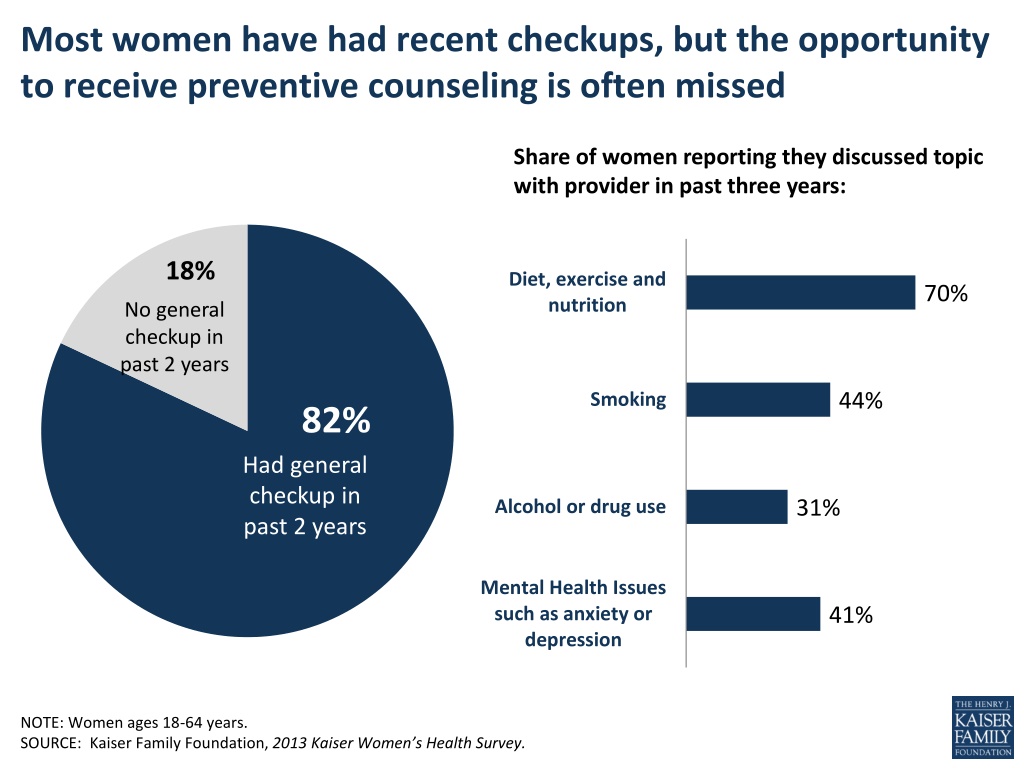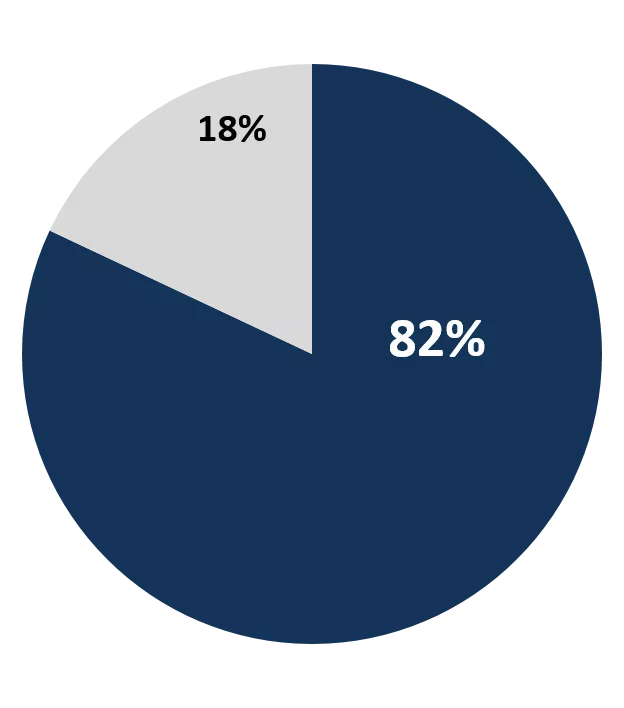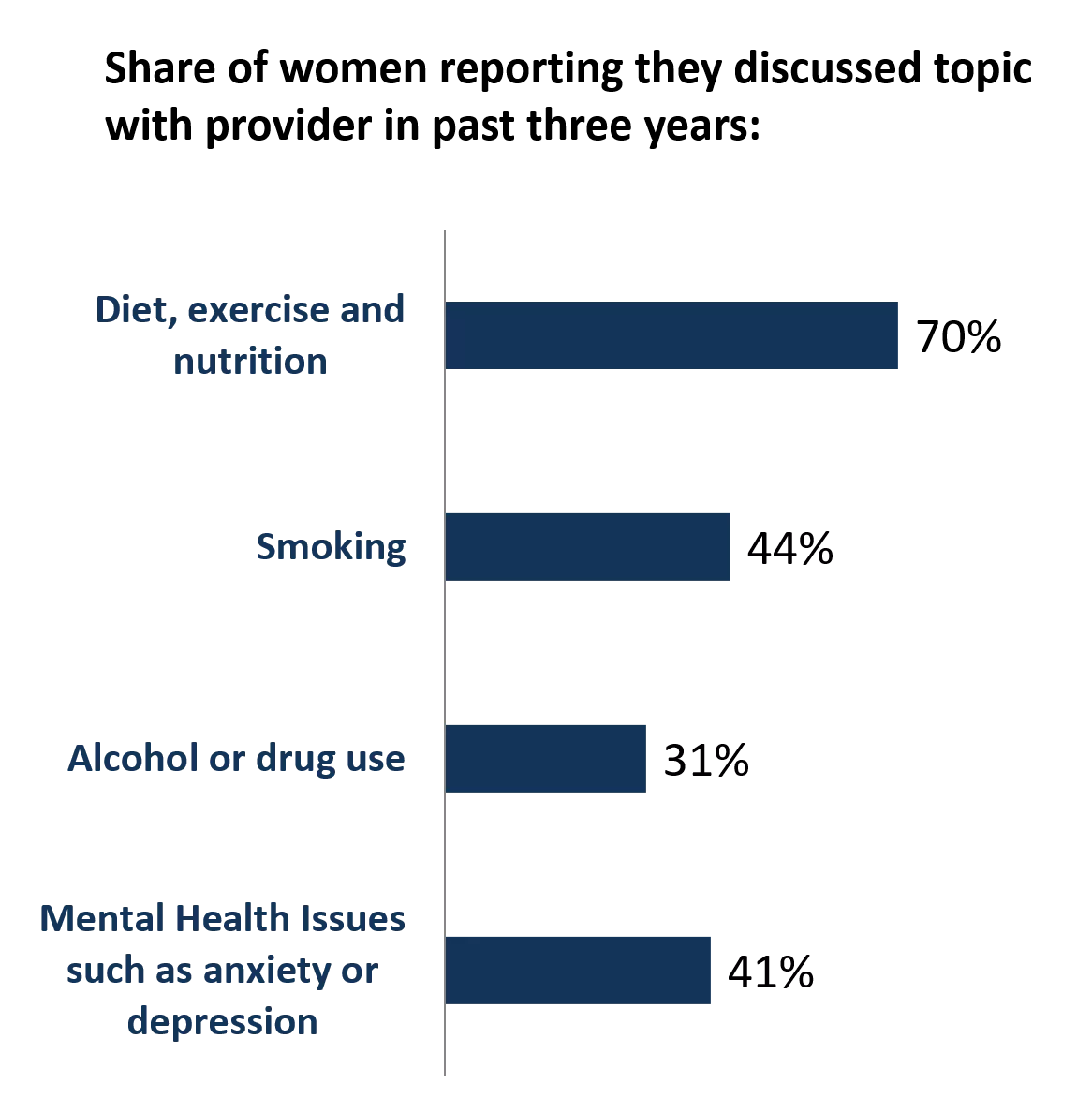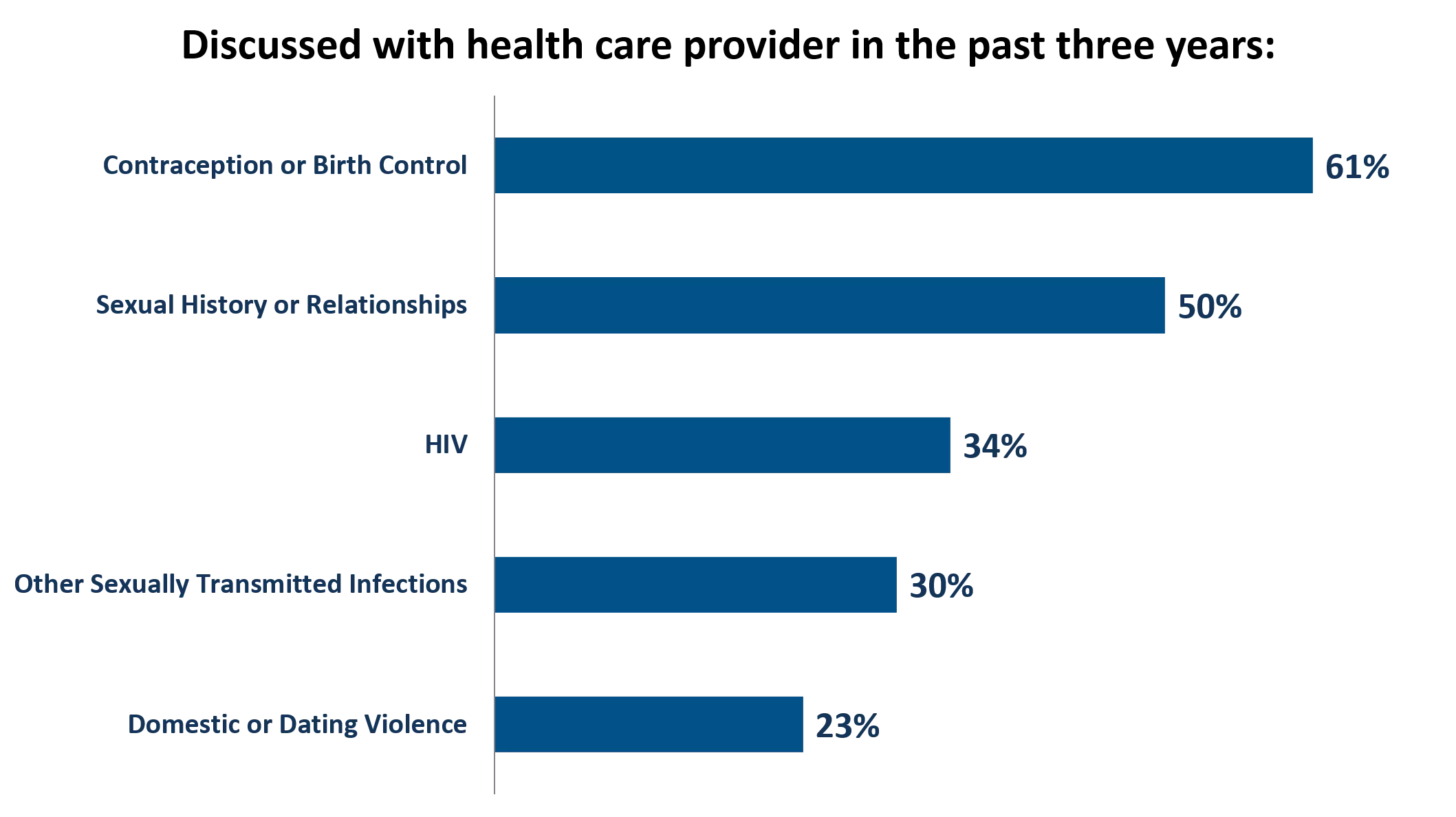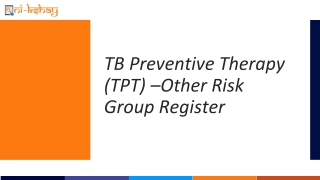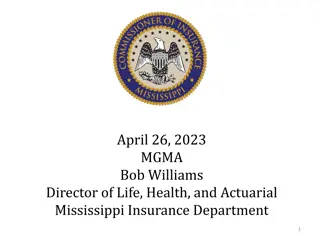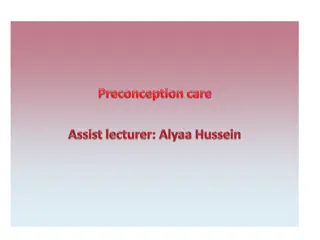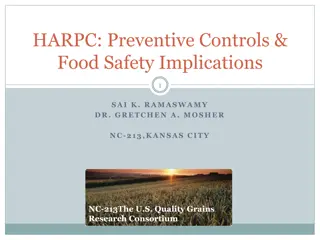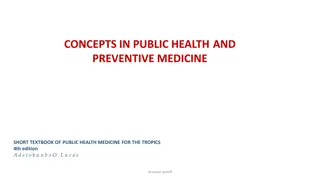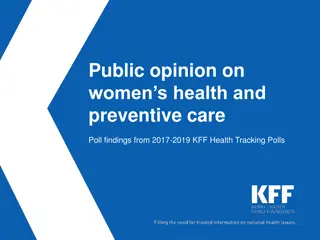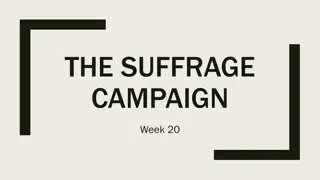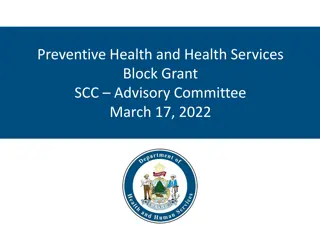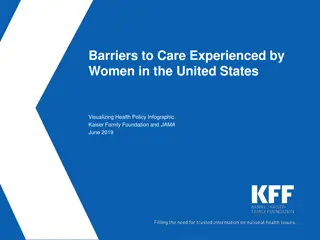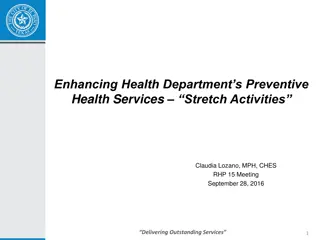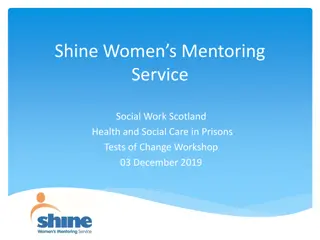Women's Preventive Health Insights
Women's preventive health data reveals missed opportunities for counseling on various topics such as diet, exercise, sexual health, and mental well-being. Issues like inadequate screening, cost barriers, and misconceptions about routine tests highlight the need for improved healthcare access and education.
Download Presentation

Please find below an Image/Link to download the presentation.
The content on the website is provided AS IS for your information and personal use only. It may not be sold, licensed, or shared on other websites without obtaining consent from the author.If you encounter any issues during the download, it is possible that the publisher has removed the file from their server.
You are allowed to download the files provided on this website for personal or commercial use, subject to the condition that they are used lawfully. All files are the property of their respective owners.
The content on the website is provided AS IS for your information and personal use only. It may not be sold, licensed, or shared on other websites without obtaining consent from the author.
E N D
Presentation Transcript
Most women have had recent checkups, but the opportunity to receive preventive counseling is often missed Share of women reporting they discussed topic with provider in past three years: 18% Diet, exercise and nutrition 70% No general checkup in past 2 years 44% Smoking 82% Had general checkup in past 2 years 31% Alcohol or drug use Mental Health Issues such as anxiety or depression 41% NOTE: Women ages 18-64 years. SOURCE: Kaiser Family Foundation, 2013 Kaiser Women s Health Survey.
Counseling on some sexual health issues among reproductive-age women is very low Discussed with health care provider in the past three years: 61% Contraception or Birth Control 50% Sexual History or Relationships 34% HIV 30% Other Sexually Transmitted Infections 23% Domestic or Dating Violence NOTE: Counseling among women ages 18-44 years. SOURCE: Kaiser Family Foundation, 2013 Kaiser Women s Health Survey.
Majority of women reporting sexually transmitted infection tests incorrectly believe tests are routine More than half of women who reported receiving an STI test incorrectly thought it was a routine part of exam Share of women ages 18-44 reporting STI tests in the past two years Under Impression Test was Routine 54% 56% 43% Did not receive an STI Test Received an STI Test Doctor or Provider Recommended Test 14% Asked to be Tested 31% 1% Don t Know NOTE: Women ages 18-44 years. SOURCE: Kaiser Family Foundation, 2013 Kaiser Women s Health Survey.
Uninsured women have much lower screening rates than insured women Percentage of women reporting they received screening tests in the past two years: Insured Uninsured 79% 74% 73% * 54% * * 43% 42% Blood Cholesterol Mammogram Pap Test NOTE: Mammogram among women ages 40-64 years. Blood cholesterol and pap tests among women ages 18-64 years. *Significantly different from insured, p<.05. SOURCE: Kaiser Family Foundation, 2013 Kaiser Women s Health Survey.
Costs can be a barrier for both uninsured and insured women Insured Uninsured 52% 50% 13% 13% Put off or postponed preventive services due to cost Skipped recommended medical test or treatment due to cost NOTE: Among women ages 18-64 years. SOURCE: Kaiser Family Foundation, 2013 Kaiser Women s Health Survey.
Adult Preventive Services to be Covered by Private Plans Without Cost Sharing Chronic Conditions Cardiovascular health Hypertension screening Lipid disorders screenings Aspirin Vaccines Healthy Behaviors Pregnancy Reproductive Health STI and HIV counseling (adults at high risk; all sexually- active women ) Cancer Td booster, Tdap Breast Cancer Mammography for women 40+* Genetic (BRCA) screening and counseling Preventive medication Alcohol misuse screening and counseling (all adults) Tobacco and cessation interventions Alcohol misuse screening/counseling MMR Diet counseling (adults w/high cholesterol, CVD risk factors, diet-related chronic disease) Meningococcal Rh incompatibility screening Screenings: Chlamydia (sexually active women <24y/o, older women at high risk) Gonorrhea (sexually active women at high risk) Syphilis (adults at high risk) HIV (adults at high risk; all sexually active women ) Contraception (women w/repro capacity) All FDA approved methods as prescribed, Sterilization procedures Patient education and counseling Hepatitis A, B Type 2 Diabetes screening (adults w/ elevated blood pressure) Gestational diabetes screenings 24-28 weeks gestation First prenatal visit (women at high risk for diabetes) Pneumococcal Cervical Cancer Pap testing (women 21+ ) High-risk HPV DNA testing Tobaccocounseling and cessation interventions (all adults) Zoster Influenza, Depression screening (adults, when follow up supports available) Screenings Hepatitis B Chlamydia (<24, hi risk) Gonorrhea Syphilis Bacteriurea Varicella Interpersonal and domestic violence screening and counseling (women 18-64) HPV (women and men 19- 26) Colorectal Cancer One of following: fecal occult blood testing, colonoscopy, sigmoidoscopy Osteoporosis screening (all women 65+, women 60+ at high risk) Folic acid supplements (women w/repro capacity) Well-woman visits (women 18-64) Obesity Screening (all adults) Counseling and behavioral interventions (obese adults) Iron deficiency anemia screening Breastfeeding Supports Counseling , Consultations and Equipment rental SOURCE:U.S. DHHS, Recommended Preventive Services. Available at http://www.healthcare.gov/center/regulations/prevention/recommendations.html. More information about each of the services in this table, including details on periodicity, risk factors, and specific test and procedures are available at the following websites: USPSTF: http://www.uspreventiveservicestaskforce.org/recommendations.htm ACIP: http://www.cdc.gov/vaccines/pubs/ACIP-list.htm#comp HRSA Women s Preventive Services: http://www.hrsa.gov/womensguidelines/
Four in ten women are unaware of new preventive services coverage Share of women who report the health reform law requires most private plans to cover the full cost of many preventive services, such as mammograms and pap tests 10% No 57% Yes 42% do not know of ACA policy 32% Don t Know NOTE: Women ages 18-64 years. Totals do not add to 100% due to rounding. SOURCE: Kaiser Family Foundation, 2013 Kaiser Women s Health Survey.
Clinicians are the most trusted source for information on the ACA Share of women reporting that they trust each source a lot for information on the ACA: Your doctor or nurse 43% Your local pharmacist 32% Friends and family 16% The news media* 9% NOTE: *The news media includes cable TV news, national or local TV news, radio news or talk radio, online news sources, and newspapers/magazines. For full question wording see topline: http://www.kff.org/health-reform/poll-finding/kaiser-health-tracking-poll- august-2013/ SOURCE: Kaiser Family Foundation Health Tracking Poll (conducted August 13-19, 2013)
